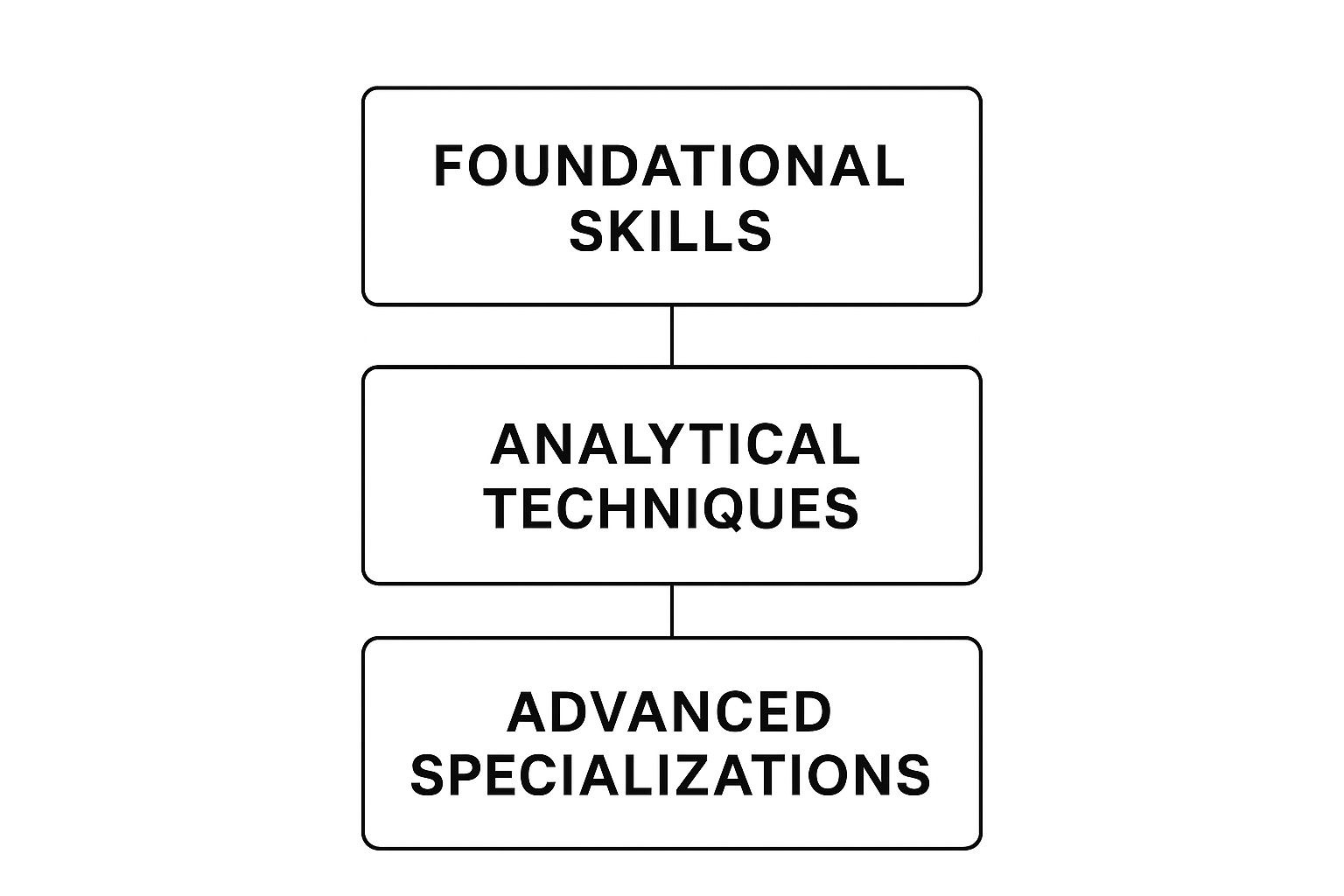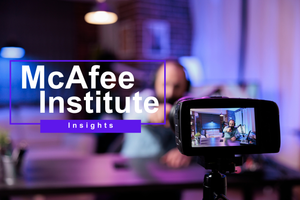Intelligence analysis training is the craft of learning how to become that detective—it teaches you how to sift through the noise, find the crucial clues, and piece them together to reveal a clear picture of what's happening now and what’s likely to happen next.
What Is Intelligence Analysis Training
At its core, intelligence analysis training is the process of learning how to turn a flood of raw, often messy information into clear, actionable intelligence. It's much more than just collecting data. It's the art and science of thinking critically, spotting hidden patterns, and communicating your findings in a way that helps leaders make tough, informed decisions. This skill set is the backbone of success for everyone from global corporations trying to outsmart the competition to government agencies working to protect national security.
The entire discipline is built around a proven framework called the intelligence cycle. This isn't just theory; it's a structured, repeatable roadmap that ensures every piece of information is handled with purpose and precision.
The Foundational Intelligence Cycle
The intelligence cycle is what separates professional analysis from guesswork. It provides a logical flow from a starting question to a final, reliable answer, with each stage building on the last.
- Planning & Direction: It all starts with the "why." Leaders and decision-makers pinpoint what they don't know and set clear objectives. What critical information do we need to find?
- Collection: Next, analysts get to work gathering raw information. This can come from anywhere—publicly available online data (OSINT), human sources (HUMINT), or even technical signals (SIGINT).
- Processing: Raw data isn't always usable. This stage is about converting it into a workable format, whether that means translating foreign documents, decoding signals, or organizing massive datasets.
- Analysis & Production: This is where the real magic happens. Analysts apply structured techniques, connect the dots, test their theories, and craft a final intelligence product that answers the original question.
- Dissemination: Finally, the finished analysis is delivered to the people who need it. This could be a quick verbal update in a high-stakes meeting or a detailed written report.
This diagram shows how training programs layer these skills, starting with the basics and moving up to more advanced, specialized capabilities.

As you can see, mastery starts with a solid foundation before you can really dig into sophisticated methods and disciplines.
To give you a clearer picture of how these concepts come together in a training program, let's break down the core components.
Intelligence Analysis Training at a Glance
| Key Skill Area | Description | Example Application |
|---|---|---|
| Critical Thinking | Learning to question assumptions, identify biases, and evaluate evidence objectively. | A financial analyst questions a sudden stock surge, looking for market manipulation instead of assuming organic growth. |
| Structured Techniques | Using established analytical methods (like Analysis of Competing Hypotheses) to ensure rigor. | A threat analyst uses a structured framework to determine the most likely actor behind a cyber attack. |
| Data Collection (OSINT) | Mastering the tools and methods for gathering information from publicly available sources. | A brand reputation manager scours social media and news sites to gauge public sentiment after a product launch. |
| Intelligence Writing | Communicating complex findings clearly, concisely, and with direct relevance to the decision-maker. | An analyst writes a one-page brief for a CEO, summarizing a competitor's strategy and recommending a counter-move. |
This table highlights just a few of the practical skills you develop. It's about building a complete toolkit, not just learning one-off tricks.
Building Your Skills From the Ground Up
Good intelligence training gives you the hands-on skills to execute every step of the cycle. Programs like the foundational certifications offered by the McAfee Institute are specifically designed to build these competencies from scratch. They don't just throw theory at you; they teach you how to apply the intelligence cycle to messy, real-world problems through practical exercises and real-world case studies.
A strong foundation in the intelligence cycle is non-negotiable. It’s the framework that prevents analysts from getting lost in the data and ensures their work directly supports organizational goals.
When you master this cycle, you start to think like an analyst. It's a systematic approach that helps you sidestep common traps like cognitive bias and ensures your conclusions are sound, well-supported, and genuinely valuable to any organization trying to make sense of a complex world.
Mastering the Core Skills of an Analyst

Becoming a great intelligence analyst isn't about memorizing a bunch of facts. It’s about building a solid set of core skills that let you cut through the noise and deliver real clarity. Think of these skills as the mental toolkit you’ll reach for every single day to turn messy, confusing data into intelligence that people can actually act on.
They aren't just items to tick off a list. They're more like interconnected muscles—the more you use them in dedicated training and practice, the stronger they get. Good intelligence analysis training goes way beyond textbook definitions. At McAfee Institute, our programs are designed to cultivate a mindset that's instinctively curious, methodical, and tough enough to resist common thinking traps.
The Power of Critical Thinking
At the heart of all good analysis is critical thinking. It's the active, disciplined process of poking holes in assumptions, questioning where evidence comes from, and weighing the strength of different arguments. In a world drowning in both information and deliberate disinformation, this is the one skill that separates a true analyst from someone who just collects data.
Let's say a corporate analyst spots a competitor’s sales numbers suddenly shoot up. A rookie might just report the numbers as they are. But an analyst trained in critical thinking immediately starts asking questions: Was this a genuine sales boom, or just the result of a one-off promotion? Could the data itself be wrong? Are we missing bigger market trends that could explain this?
This kind of disciplined skepticism is absolutely essential for avoiding expensive mistakes and getting to the real story behind the numbers. McAfee Institute's training reinforces this skill by presenting students with complex scenarios where the obvious answer is rarely the correct one, forcing them to think critically.
Using Structured Analytic Techniques
If critical thinking is the mindset, then Structured Analytic Techniques (SATs) are the roadmaps that put that mindset to work. These are proven methods designed specifically to help you organize a mountain of information, fight back against your own unconscious biases, and keep your analysis sharp and rigorous.
SATs provide a mental scaffold for you to build your assessment on. This prevents your entire line of reasoning from collapsing under the weight of too much data or your own hidden assumptions.
Structured Analytic Techniques aren't about boxing you in or killing creativity. Quite the opposite. They give you the freedom to explore complex problems with confidence, because you know you're guided by a process that is designed to minimize bias and maximize clarity.
Here are a few practical examples of SATs you’ll encounter:
- Key Assumptions Check: This is where you write down every single assumption your analysis is built on and then challenge each one. If just one key assumption turns out to be false, your whole conclusion could be worthless.
- Analysis of Competing Hypotheses (ACH): Instead of falling in love with your first theory, this technique forces you to develop several plausible explanations and then test each one against the evidence. The goal is to see which hypothesis holds up best, not which one you like best.
- SWOT Analysis: A classic for a reason. This framework helps you assess the Strengths, Weaknesses, Opportunities, and Threats for any given situation or organization.
Learning these techniques in a quality intelligence analysis training program, like those offered by McAfee Institute, gives you a repeatable, defensible process for handling any analytical challenge that comes your way.
The Art of Open-Source Intelligence
Today, a staggering amount of valuable information is just sitting out there in the open—if you know where and how to look. Open-Source Intelligence (OSINT) is the craft of legally finding, collecting, and analyzing data from public sources to produce actionable intelligence. We’re talking about everything from social media and news reports to academic journals and public government records.
And no, this isn't just about being good at "Googling." Real OSINT skill involves knowing how to navigate the digital world ethically, check the credibility of your sources, and connect seemingly random dots of public data to uncover hidden patterns or emerging threats.
For example, an analyst could piece together a detailed picture of a competitor’s supply chain weak spots by analyzing public shipping records, social media chatter in a certain area, and local news reports—all without touching a single piece of private company data.
Programs like the Certified Cyber Intelligence Professional (CCIP) from the McAfee Institute are built around these practical skills. They teach you how to use OSINT tools and methods through hands-on modules, making sure you can apply what you learn directly to real-world investigations.
Finding the Right Training Program for You

Starting a career in intelligence analysis isn't just a job change; it's a commitment. A huge part of that commitment is figuring out the best way to get trained. The good news is you have more options than ever, from traditional university classrooms to focused online certifications. Picking the right program is your first mission, and it will absolutely set the stage for your success in this incredibly demanding field.
The demand for sharp, skilled analysts has exploded worldwide, and the training world has scrambled to keep up. You can now find everything from intense 12-week bootcamps that dive deep into Python, OSINT, and data analytics to sprawling academic degrees. The industry has clearly shifted, blending old-school intelligence tradecraft with modern data science.
Traditional vs. Specialized Training
When you boil it down, you’re looking at two main paths: the traditional academic route or specialized, job-centric training. Each has its own strengths and is built for different kinds of learners with different goals.
A university degree—like a Bachelor's or Master's in intelligence studies—offers a rock-solid theoretical foundation. These programs are fantastic for understanding the history, ethics, and strategic thought that form the bedrock of the discipline. But let's be honest, they're a massive investment in both time and money, often requiring a full-time commitment that just isn't realistic for many people.
On the flip side, specialized certification programs are built for one thing: getting you job-ready, fast. They cut straight to the chase, teaching you the exact skills employers are desperately looking for right now. This makes them perfect for career-changers, professionals who need to add a new skill, or anyone who can't put their life on hold for two to four years. McAfee Institute exemplifies this model, focusing on job-ready skills that translate directly into workplace competence.
The best intelligence analysis training isn't just about what you learn; it's about how you learn it. Flexible, self-paced programs empower you to build critical skills without having to put your life on hold, making a career transition more accessible than ever.
The Rise of Blended Learning and Online Certifications
Today's analyst needs to be a hybrid professional. You have to understand classic analytical methods while also being comfortable with data-driven tools and techniques. This reality has fueled the growth of blended programs that teach both the "why" of strategy and the "how" of modern tech.
This is exactly where accredited online certifications from organizations like the McAfee Institute come in. They provide a powerful, flexible alternative to the old academic model, letting you master critical skills entirely on your own schedule. It’s the ideal setup for professionals who want to move up without stepping out of the workforce.
For example, a McAfee Institute certification program is designed from the ground up to give you the specific, actionable skills needed to identify, evaluate, and neutralize threats. It’s not about broad theory; it's about practical knowledge you can put to work on day one, a key benefit for anyone looking to make an immediate impact.
And if your interests lean more toward the digital side of the house, where cyber and traditional intelligence collide, a certification like the Certified Cyber Intelligence Investigator (CCII) shows how you can build the expertise needed to tackle today's most complex online threats.
Choosing Your Path
So, when you're weighing your options for intelligence analysis training, you need to get real with yourself and consider a few key factors:
- Career Goals: Are you aiming for a high-level policy role in a government agency, or do you want to be a hands-on technical analyst in the private sector?
- Time Commitment: Do you have years to dedicate to a degree, or do you need to be qualified for a new role in a matter of months?
- Current Skills: Are you starting from square one, or are you an experienced pro looking to add a specific, high-demand skill to your toolkit?
- Learning Style: Do you learn best in a structured classroom, or do you prefer a self-paced, practical environment where you can learn by doing?
For a growing number of aspiring and current professionals, the direct, flexible, and targeted nature of online certifications is the clearest path to a successful career. McAfee Institute programs don't just give you a credential; they arm you with the practical, real-world skills you need to excel from the moment you start your new role. That's a serious advantage in a competitive market.
The Growing Need for Geopolitics in Intelligence
While core analytical skills are the bedrock of any intelligence role, some specializations can elevate an analyst’s value from tactical to truly strategic. Geopolitical intelligence is one of the most critical.
It’s the art and science of understanding how geography, politics, economics, and culture all intersect to shape global events. This field has exploded far beyond its traditional home in the shadowy corridors of spy agencies and embassies.
In our deeply interconnected world, a political tremor in one country can send shockwaves through supply chains continents away. A new environmental regulation in Europe can directly impact a factory in Asia. It's precisely why geopolitical insight has become non-negotiable for multinational corporations trying to manage risk, plan market entries, and secure their global operations.
They need analysts who can connect the dots and see what's coming before it arrives. Developing this foresight is a cornerstone of advanced intelligence analysis training.
Why Strategic Insight Matters More Than Ever
Strategic intelligence isn't about the daily headlines; it’s about the long game. The focus is on the capabilities and intentions of competitors or nation-states, looking at what's likely to unfold over the next year, five years, or even a decade. Analysts in this space are the navigators for their organizations, charting a safe course through the turbulent waters of global affairs.
For a business, this might mean analyzing a competitor's R&D investments to predict their next big product launch. For a government agency, it could involve assessing a foreign power's military modernization to understand future threats. This kind of foresight is an incredibly valuable skill, but it doesn't just happen—it requires dedicated, specialized training to build.
The good news? This advanced education is more accessible than ever. Geopolitical intelligence training is increasingly available through specialized online programs. For example, some McAfee Institute certifications include modules on geopolitical fundamentals, the intelligence cycle, and building analytical strategies, serving everyone from students to seasoned business leaders.
Weaving Geopolitics Into Your Skill Set
To be truly effective, an analyst has to understand that no threat exists in a vacuum. A cyberattack could be driven by simmering geopolitical tensions. A complex financial crime might be a form of state-sponsored economic warfare.
This is exactly why the best training programs refuse to treat these subjects as separate silos.
Geopolitical context is the lens through which all other intelligence should be viewed. It provides the 'why' behind the 'what,' turning simple data points into meaningful strategic insights that drive proactive decision-making.
At McAfee Institute, we live by this principle. We've designed our curriculum to weave strategic and geopolitical context directly into our certification programs. We believe a top-tier analyst must be able to connect the dots between a single incident and the larger global landscape it occupies.
By integrating this broader perspective into our courses, we ensure our graduates are prepared to analyze threats and opportunities with a sophisticated, holistic view. This is precisely the capability that top employers in both the public and private sectors are desperately seeking.
To see how these advanced topics are covered, you can review the comprehensive intelligence programs offered by McAfee Institute. Our approach ensures that certified professionals don't just report on events—they understand the powerful forces shaping them, providing immense value to any organization.
How AI Is Transforming Intelligence Analysis

Technology is changing the game in intelligence analysis, and artificial intelligence (AI) is leading the charge. This isn’t some far-off concept; AI is a practical tool that's already reshaping how analysts work. It's become a powerful partner in the hunt for clarity, capable of tackling tasks at a scale and speed that were once unthinkable for a human.
The biggest way AI helps is by processing enormous amounts of data. Picture a super-powered assistant that can read, sort, and connect millions of documents and data feeds in the time it takes you to read a single page. This allows AI tools to sift through petabytes of information, spotting subtle patterns and anomalies that would otherwise go completely unnoticed.
The Analyst-Machine Synergy
Let's be clear: this shift isn't about replacing human analysts. It's about creating a powerful synergy where the analyst and the machine work together. AI handles the heavy lifting of data processing and pattern recognition, which frees up human experts to focus on what they do best:
- Critical Thinking: Making sense of the context behind the data AI uncovers.
- Hypothesis Testing: Using AI-driven insights as a launchpad to build and test theories.
- Strategic Forecasting: Applying intuition, experience, and deep subject matter knowledge to predict what comes next.
In this partnership, the machine shows you what is happening, while the human determines so what? and what's next?. This collaborative approach results in faster, more accurate, and more insightful intelligence. It helps organizations move from simply reacting to events to proactively anticipating them.
The true power of AI in intelligence analysis lies in its ability to augment human intellect, not replace it. By automating low-level tasks, AI gives analysts the time and mental space needed for high-level strategic thought.
This new reality makes one thing crystal clear: intelligence analysis training must embrace technological change. As AI tools become woven into daily workflows, analysts need to know more than just traditional tradecraft. They must also know how to effectively operate these advanced systems and, more importantly, how to interpret what they produce.
Adapting Training for an AI-Driven World
The global intelligence community is quickly adopting these new tools. You can see this trend in the growing focus on AI in professional development and the global adoption of AI in intelligence education that is shaping the future of the field.
Recognizing this critical shift, we at the McAfee Institute are committed to keeping our certification programs at the forefront of the industry. We are constantly updating our course materials and practical exercises to include the latest tech tools and AI-driven techniques.
Our approach ensures that when you earn a certification from the McAfee Institute, you’re not just learning timeless analytical principles. You’re also getting hands-on familiarity with the modern tools that define the job today. This commitment means our certified professionals are fully prepared to step into the future of analysis, ready to deliver value from day one in any intelligence role.
Start Your Certification Journey Today
Knowing the theory is one thing, but in the world of intelligence, proving you can apply it is what really counts. Once you've started your intelligence analysis training, the natural next step is to get your skills formally recognized. Certification is what turns your knowledge into a credential that employers not only respect but actively look for.
Think of it this way: anyone can say they're a good analyst. A certification from a trusted institution like the McAfee Institute proves it. It's an unbiased, third-party stamp of approval on your abilities, which takes the guesswork out of hiring and instantly puts you ahead of the pack. This is especially true in a field where trust and proven skill are everything.
Why Certification Is Your Career Accelerator
Earning a certification isn’t just about adding a line to your resume; it's a strategic career move. It signals a deep commitment to your profession and gives you a clear path for advancement.
At McAfee Institute, we specialize in providing these career-defining credentials. Our programs are built from the ground up to give you the practical, in-demand skills that organizations in both the government and private sectors are desperate for. We focus on real-world application, so when you finish a certification, you're not just "book smart"—you're ready to tackle actual challenges from day one.
Certification isn't just a piece of paper; it's a testament to your dedication and a clear indicator to employers that you possess the verified skills needed to deliver immediate value. It's your professional seal of approval in a competitive job market.
Finding the Right McAfee Institute Program for You
The best certification for you depends entirely on where you want to go in your career. McAfee Institute offers a variety of specialized programs, each designed for a specific niche within the intelligence field. When you align your training with a particular role, you become a much more compelling candidate.
Here are a couple of our most popular certifications:
- Certified Cyber Intelligence Investigator (CCII): This is for professionals who want to work where cybersecurity and intelligence meet. You'll learn how to investigate complex online threats, from tracking down malicious actors to dissecting digital evidence. It's a perfect fit for roles in corporate security, cybercrime units, or threat intelligence teams.
- Certified Social Media Intelligence Expert (CSMIE): Social media is an absolute goldmine of open-source intelligence. The CSMIE program shows you how to ethically gather and analyze data from these platforms to support investigations, protect a brand's reputation, or keep an eye on emerging threats. This is a must-have for OSINT specialists, brand protection managers, and law enforcement investigators.
For those wanting to build a truly robust foundation in cyber-focused intelligence, we highly recommend the Certified Cyber Intelligence Professional (CCIP). This program is designed to give you the full range of skills needed to succeed in today's intelligence landscape. When you partner with McAfee Institute, you’re getting more than a credential—you’re getting a direct line to the high-value roles that define a career in this dynamic field.
Frequently Asked Questions
Thinking about a career in intelligence analysis can bring up a lot of questions. It’s a field that seems complex from the outside, but breaking into it is more straightforward than you might think. Let's walk through some of the most common questions we hear from aspiring analysts and give you some real-world advice to get you started.
How Much Math Do I Need for Intelligence Analysis?
Let’s get one thing straight: you don't need a Ph.D. in mathematics. What you do need is a solid comfort level with numbers and logical thinking. So much of modern intelligence work is built on data. You'll be looking at statistics, spotting patterns in large datasets, and thinking in terms of probability to build your case.
The key isn't about complex calculus; it's about applied reasoning. If you're looking at roles in cyber or financial intelligence, this becomes even more critical. Here at the McAfee Institute, our certification programs are designed to build this muscle, weaving data interpretation and logical problem-solving into the curriculum so you're ready for the quantitative side of the job.
The goal isn't to be a mathematician. It's to be a critical thinker who can use data to tell a story. The most important skill is looking at a set of numbers and asking, "What's really going on here?"
Can I Become an Analyst Without a Degree?
Yes, absolutely. While government gigs often have rigid degree requirements, the private sector plays by a different set of rules. More and more, corporations are prioritizing proven, real-world skills and respected industry certifications over a traditional four-year degree. A strong portfolio showing what you can do often speaks louder than a diploma.
This is exactly where specialized intelligence analysis training becomes your biggest advantage. Earning a credential like the Certified Cyber Intelligence Investigator (CCII) from the McAfee Institute is direct proof for employers that you've mastered a specific, high-demand skill set. It's verified evidence of your abilities, which can be far more compelling than a general academic background, especially for hands-on analyst roles.
Is Intelligence Analysis a Good Career Path?
Without a doubt. Intelligence analysis is a stable and expanding field. The demand is high across both the public and private sectors because every major industry—finance, tech, retail, healthcare, you name it—needs sharp people who can sort through complex information to head off risks and spot opportunities.
The skills you build as an analyst are also incredibly versatile, opening doors to all sorts of career paths down the road. A certification from the McAfee Institute doesn't just get your foot in the door for that first job; it sets you up for long-term growth, making you a go-to asset for any organization that wants to stay ahead of the curve.
Ready to build the proven skills that employers are actively looking for? McAfee Institute provides world-class, accredited training to help you launch or advance your career in intelligence and investigations. Explore our comprehensive certification programs and start your journey today.











Member discussion